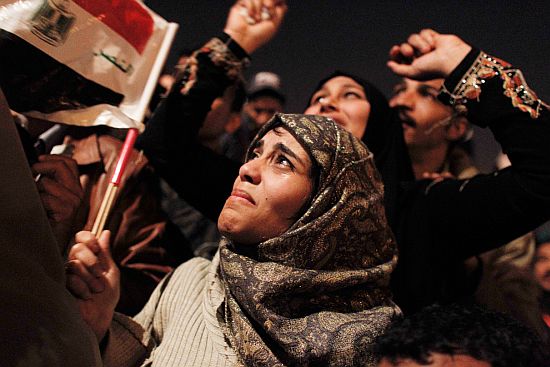“As crowds gathered outside the White House, there was little question that Mr. Obama’s presidency had forever been changed.” That’s the caption the New York Times put under the photo below.

David Axelrod might have preferred this event to have occurred closer to the end of Obama’s reelection campaign, though accusations that the news was being timed to serve partisan political interests would have been even harder to refute than they are now.
“Osama bin Laden, the mastermind of the most devastating attack on American soil in modern times and the most hunted man in the world, was killed in a firefight with United States forces in Pakistan, President Obama announced on Sunday night,” is the lead in the New York Times main report.
US forces on a mission to kill or capture (not capture or kill) bin Laden, killed him “in a firefight” in Pakistan. At least that’s what the Times reports. Only further into the report does it reiterate what Obama actually said: “After a firefight, they killed Osama bin Laden and took custody of his body.”
The White House chooses its words carefully. If bin Laden was killed during the firefight then it’s reasonable to assume that this is exactly what Obama would have said. To say that the al Qaeda leader was killed after a firefight seems to suggest he was executed.
The exact manner in which the death occurred may explain why, at least thus far, no photographic evidence has been released. If bin Laden was indeed executed it was most likely for political reasons.
Bin Laden’s capture could surely have provided an intelligence bonanza of inestimable value. His subsequent trial would indeed have been a compelling demonstration of what it should mean to deliver justice. But it would also have opened a can of worms.
If bin Laden had been tried in front of a military tribunal then yet again this government would be undermining the strength of the criminal justice system. If on the other hand he was tried in a civilian court, it would be hard for the administration to justify its continued use of military tribunals for any terrorism-related cases.
During a trial, there would be no predicting what kind of strategically damaging information might have been revealed that could have affected US relations with Pakistan, Saudi Arabia or other Gulf nations.
And then there would be the headache of deciding where the trial could take place.
Just over a year ago, it was Attorney General Eric Holder who assured Congress that there was no risk of bin Laden ever being read his Miranda rights.
“The reality is that we will be reading Miranda rights to the corpse of Osama bin Laden. He will never appear in an American courtroom. That’s the reality. … He will be killed by us, or he will be killed by his own people so he’s not captured by us. We know that,” Holder said emphatically.
“Dead men don’t talk,” is a truth esteemed by those who value secrets, but the fact that bin Laden’s death leaves so many questions unanswered means that he will remain a potent force for those who want to promote conspiracy theories of every variety. The celebrations in this “victory” will likely be quite short-lived.
Lawrence Wright notes:
The fact that bin Laden was found in a compound in a wealthy retirement community populated in large part by former Pakistani military officers raises dire questions about the relationship of the Pakistani army and its intelligence community to radical Islamic terrorists. For the past decade, as America has poured billions into a country where about one in a hundred citizens pays income taxes, the Pakistani military/intelligence complex has gone into the looking-for-bin-Laden business. Now, they are out of business. If it is true that Pakistani intelligence was helpful in locating bin Laden, and kept that matter secret, then we can begin to sort out our fraught relationship with that troubled country on a more equitable, trusting basis. If that turns out not to be the case, then there will be a dreadful reckoning to come.
Al Qaeda and its followers will be attempting to make a powerful statement in the next several weeks to demonstrate that they are still relevant following this mighty loss. Al Qaeda affiliates may speed up operations that were in the pipeline. The recent bombing in Marrakesh and the arrests in Germany demonstrate that Al Qaeda continues to have enthusiastic, entrepreneurial operatives that are eager to make their own mark on history.
The fact that bin Laden had found refuge close to Islamabad may or may not reveal a role played by individuals in Pakistan’s intelligence and military establishment, but perhaps more importantly it should serve as a reminder of what was already known in 2001: that al Qaeda never was an organization tied to a particular place.
Al Jazeera‘s political analyst, Marwan Bishara, writes:
[F]or the Muslim world, bin Laden has already been made irrelevant by the Arab Spring that underlined the meaning of peoples power through peaceful means.
It is also worth recalling that bin Laden’s al-Qaeda and its affiliates have killed far more Arabs and Muslims than they did Westerners.
And it was only after they failed to garner real support in the Arab world that they ran back to Afghanistan and began to target the West.
After long hijacking Arab and Muslim causes through its bloody attacks on Western targets, al-Qaeda has been discredited since 9/11 and its organisational capacity diminished by Western counter terror measures.
Al-Qaeda’s bin Laden has provided the Bush administration with the excuse to launch its disastrous and costly wars in the greater Middle East.
As expected, Washington’s wars in Iraq, Afghanistan and Pakistan continued to provide al-Qaeda with fresh recruits and support in the Muslim world and perpetuate a cycle of violence that ripped through the region for the last decade.
However, it has been the more implicit and less costly US and Western intelligence services that succeeded to a large degree in curtailing al-Qaeda activities, limiting the movement of its leaders that eventually led to his killing.
So what will this mean for the US war in Afghanistan and Pakistan? Certainly Washington has less reason or justification to wage a war in Afghanistan now that bin Laden is no more.
It might also find more readiness among certain Taliban leaders in the absence of the thorniest issue of al-Qaeda, to make a deal that insures a power sharing arrangement in favour of the Taliban in return for curbing the use of Afghanistan by al-Qaeda to export “terrorism”.
Bin Laden will continue to be a distraction for the short term, and especially if some of al-Qaeda groups muster revenge attacks.
But in the long term, it is the historical transformations in the Arab and Muslim world that will eventually close the book on al-Qaeda.

